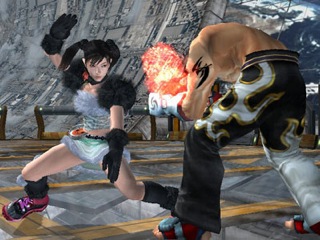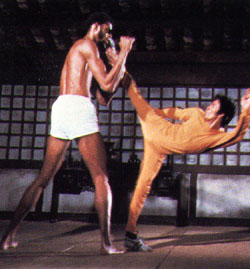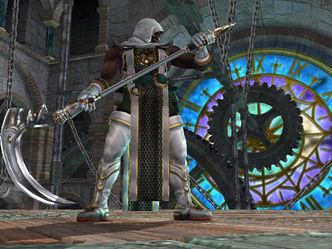Tekken, Soulcalibur, Action Films and Young People

Like it or not, computer and console games are here to stay. Many older people are rather concerned about what they see as the almost obsessive and addictive manner in which their children and/or grandchildren play such games. This article is written by a self-confessed “big kid” who once frowned upon such games and has recently spent probably too many hours playing them. It focusses on the Playstation 2 games Tekken 5 and Soulcalibur 3 (both Japanese), and on the related subject of action films.
Are these games a waste of time and energy? To that question I would answer yes and no. Young people are influenced by the values of the older people they spend time with, and one does hope that the former realize that relationships with human beings are of far greater importance than their relationships with “virtual” characters on screen. I’ve often tried asking the sweet character Xiaoyu from Tekken out but she always ignores me.
Action films and console games have a reciprocal relationship although they come from competing industries. Think of the many “jump and run” games where one struggles from level to increasingly difficult level. Are they not reminiscent of Bruce Lee’s sadly unfinished film “The Game of Death”, where in order to retrieve a stolen artifact he has to get past the guards on a many-levelled pagoda. However, I find it significant that Bruce had planned that on the highest level even the most amazing fighting skills would be of no avail and rescue would come from a being of great wisdom.

Although some people have a negative attitude towards CGI effects in films, I personally feel it inevitably goes with the territory. Much of cinema over the last 70 years has been about fantasy, magic and illusion. Film is a plastic medium and lends itself to mythic themes and magical illusions. If computer effects help to realize that, then it’s not surprising these effects are used. Imagine reading a child a fairy-tale after one has edited out all the magic from the story and telling it without taking recourse to any vocal effects whatsoever. The child might indeed fall asleep to the bland unvarying monotone, which is fine only if that is the intention……I think the objection may have more to do with the increasingly dominant role computers play in most of our lives.
Be that as it may, the films Shaolin Soccer, Kung-Fu Hustle, Dragon Tiger Gate, Chinese Tall Story, Wuji (The Promise), Arahan, and manga films such as Ghost in the Shell 1&2 and the Korean anime´ Wonderful Days have shown that one can make entertaining films with much added CGI. Of course sometimes there is too much of it, and there is a difference between using CGI to enhance certain scenes or to make the impossible look possible, and making the film look predominately like a computer game.
Need one take these things so seriously? Is the attitude that a film is just a film, a game is just a game, valid? When one sits for hours in front of a screen one is subjecting oneself to a powerful influence. It is quite tangible and verifiable. After such sessions I’ve found myself “full of it”. Although not without considerable artistic merit, these games are fast and flashy and the brain and nervous system get bombarded. The images churn away in the mind.
So what is it that draws young people with such magnetic force into arcades or impels them to turn on their nintendos, x-boxes and play stations? Well, one explanation may be that in many respects our lives are dominated by rules and laws, social conventions, written and unwritten, either imposed from within or from the outside. Without many of these codes of conduct, life in society would become even more barbaric and messy than it already often is, but the inherent restrictiveness and over-controlling tendencies of these well-intentioned rules often evoke the desire to be free of them. One method of escape is imagined escape, such as dreaming. Why are action films so popular ? Isn’t it because those watching them dream of being a bit more like those dashing and dynamic characters on screen? And that world is often conveniently clear cut. The bad guys are so obviously and inexcusably bad it seems more than justified that one should at least give them a decent thrashing. To return to computer games, that’s basically what Tekken and Soulcalibur are about: knocking out the opponents, and one can act out on screen what would have highly problematical consequences for one in “real life”.
Whilst pondering over this whole subject, a haunting scene from a rather cheap budget yet very chillingly atmospheric Japanese film “Pulse” kept returning to my mind. In this film the city in which the story takes place is depicted as being mysteriously drained of life. The young protagonist finds himself alone in an arcade. Nearly all the inhabitants of the city have faded away, and yet the computer games and machines keep on whirring and flashing and making noise. The games continue playing by themselves….
Clemens Ziegler
See also Comment on Tekken,Soulcalibur, Action films and Young People in Health and Wellbeing

